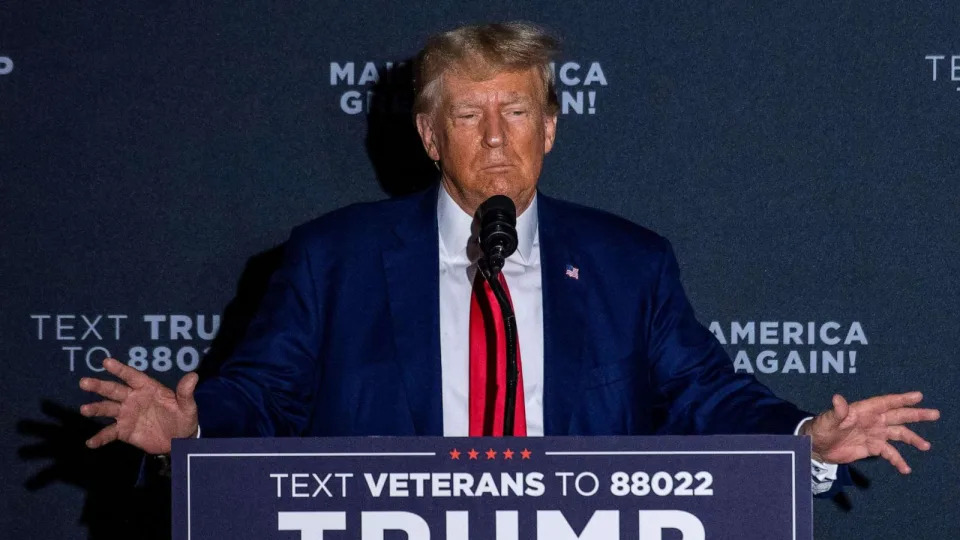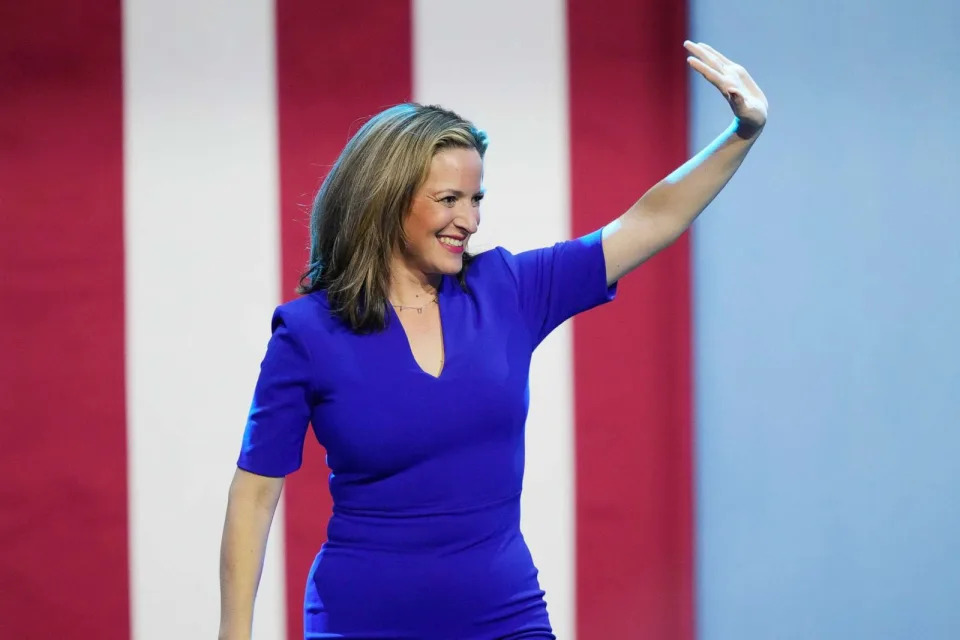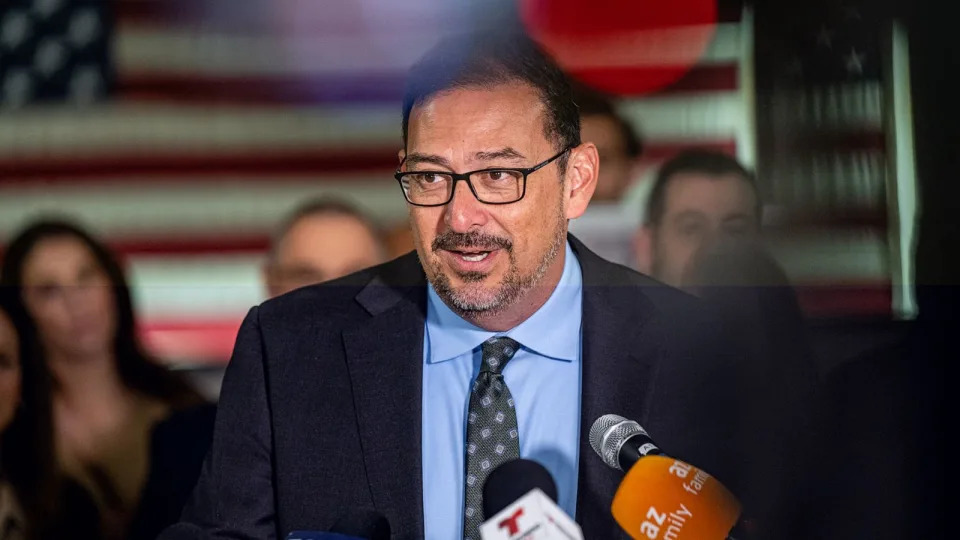Efforts to keep former President Donald Trump off the 2024 ballot under the 14th Amendment are gaining momentum as election officials in key states are preparing for or starting to respond to legal challenges to Trump's candidacy.
The argument to disqualify Trump from appearing on primary or general election ballots in 2024 boils down to Section 3 of the U.S. Constitution's 14th Amendment, which states that an elected official is not eligible to assume public office if that person "engaged in insurrection or rebellion against" the United States, or had "given aid or comfort to the enemies thereof," unless they are granted amnesty by a two-thirds vote of Congress.
Several advocacy groups have said that Trump's actions on Jan. 6, 2021, fit that criteria -- that he directly engaged in an insurrection. The legal theory has been pursued, unsuccessfully, against a few other elected Republicans; arguing their actions around Jan. 6 and support for overturning the 2020 election results amounted to the disqualifying behavior.
Trump has denied any involvement in the attack on the Capitol.
"Joe Biden, Democrats, and Never Trumpers are scared to death because they see polls showing President Trump winning in the general election," Trump campaign spokesperson Steven Chung told ABC News in a statement. "The people who are pursuing this absurd conspiracy theory and political attack on President Trump are stretching the law beyond recognition much like the political prosecutors in New York, Georgia, and DC. There is no legal basis for this effort ... "
The push to disqualify Trump under this constitutional clause gained more traction when two members of the conservative Federalist Society, William Baude and Michael Stokes Paulsen, recently supported the idea in the pages of the Pennsylvania Law Review. Following the Baude and Paulsen article, retired conservative federal appeals judge J. Michael Luttig and Harvard Law Professor Emeritus Laurence Tribe made the same argument in The Atlantic.
MORE: 14th Amendment, Section 3: A new legal battle against Trump takes shape
Now, threats of filings against Trump under this clause are gaining steam in a number of states, including New Hampshire and Arizona and in Michigan, a lawsuit to disqualify Trump was filed on Monday. Secretaries of state say they have started to take steps to prepare for the possibility of administering elections without the current GOP front-runner.
In an interview with ABC News, Michigan Secretary of State Jocelyn Benson, a Democrat, said that she and other secretaries of state from Pennsylvania, Georgia, Nevada, New Hampshire and Maine started having conversations over a year ago about preparing for the legal challenges to Trump's candidacy.
"I'm talking every day with colleagues about this, we're all recognizing that our decisions that we make may in some cases be the first but won't be the last and there may be multiple decision points throughout the course of the election cycle," Benson said. "So, I think the public needs to be prepared for this to be an ongoing issue that is it has several resolution points and evolutions points throughout the cycle."
But as conversations grow around the use of the 14th Amendment provision, some legal scholars and election officials are increasingly concerned about the practicality of the emerging lawsuits.
"The most difficult aspects of the litigation that the challenges to Trump's eligibility will generate probably aren't so much substantive as they are procedural," Tribe wrote in an email to ABC News, noting that there is a lack of clarity about who has standing to bring the challenges.
"You can be sure that many secretaries of state, advised by many legal experts from across the ideological spectrum, are now studying the details of the legislative regimes in place in their respective states for dealing with challenges to the eligibility of candidates aspiring to become president," he continued.
New Hampshire secretary of state conferring with attorney general
Bryant "Corky" Messner, a lawyer who lives in New Hampshire and was previously endorsed by Trump during his 2020 Senate run in the state, announced last week that he had begun the steps to challenge Trump's eligibility to appear on the New Hampshire primary ballot.
New Hampshire's Secretary of State Office confirmed to ABC News that Messner met with Secretary of State David Scanlan, a Republican, last Friday to discuss Section 3 of the 14th Amendment.
The Secretary of State office also confirmed that it was flooded with calls from supporters of Trump on Monday, after conservative activist and host Charlie Kirk claimed that the state was trying to keep Trump off the ballot.
That office, and the attorney general's, then released a joint statement clarifying that they have not taken any actions to prevent Trump from appearing on the primary ballot.
"Neither the Secretary of State's Office nor the Attorney General's Office has taken any position regarding the potential applicability of Section Three of the Fourteenth Amendment to the United States Constitution to the upcoming presidential election cycle," their statement reads.
The statement also said that Scanlan has asked the state's attorney general to advise his office "regarding the meaning of Section Three of the Fourteenth Amendment to the United States Constitution and the provision's potential applicability to the upcoming presidential election cycle."
Michigan fields its first 14th Amendment lawsuit
Robert Davis -- widely known in Michigan as a citizen activist who serially sues state politicians -- on Monday filed a lawsuit that urges Secretary of State Benson to declare Trump is ineligible to run for office.
Davis asked Benson to make a decision on Trump's candidacy within 14 days.
Asked by ABC News her thoughts on Davis' lawsuit, Benson said her focus is on upholding the law and acknowledged her state's position as a battleground will influence public narrative nation wide surrounding the issue.
"My commitment is to making sure that even in this very unprecedented uncharted territory we find ourselves in that we at all times proceed according to the law, both substantively and procedurally."
Benson had said during an interview on a Michigan Information and Research Service News podcast that it was too soon to decide on whether Trump will appear on Michigan's ballot.
"I have said for, really since 2020, that this presidential cycle in 2024, is, I believe, in many ways going to be the grand finale of all the bumps and the challenges we've seen and endured since the 2020 election cycle, maybe even 2016."
Arizona's secretary of state gathering clarification from legal counsel
In Arizona, Secretary of State Adrian Fontes, a Democrat, said that he was planning for the possibility of challenges to Trump's ballot eligibility but does not himself have the authority to explicitly bar Trump from appearing on the ballot.
Last year, the Arizona Supreme Court ruled that there would be no way for his office to enforce the disqualification clause, only Congress would have the right to do so -- a ruling Fontes called "dead wrong."
"If that was the case, then no constitutional qualifier applies. So, a 23-year-old born in Poland, for example, who never became a citizen, could run for president in Arizona," Fontes told ABC News.
Fontes said he doesn't know of any specific individual or groups who have organized to file a lawsuit challenging Trump's eligibility, but his office has gotten phone calls and notes objecting to the former president potentially appearing on the ballot.
For now, he's "deciding on how to decide" how to proceed with who exactly appears on the 2024 ballot and gathering clarification from legal counsel.
"I cannot imagine a scenario where … a secretary of state allows Mr. Trump to be on the ballot and does not get sued. I can also not imagine a scenario where Mr. Trump is disallowed and does not get sued. I mean, this is this is this is where we are now. So I believe that we will be sued no matter what. I've still got to do my due diligence to get the job done," Fontes said.
Fontes noted that he's preparing so far in advance because he's concerned about the toll these challenges and potential countersuits might pose to the voting process and election workers, especially in a state like Arizona, which has dealt with tedious and sometimes dangerous challenges surrounding election results over the past few cycles.
"Away from the political considerations This is an administrative issue. This is a ministerial point in time that cannot be avoided," Fontes said. "We don't have the luxury of waiting until next November. And anybody who's misunderstanding the calendar and what it means to run an election has to sort of disabuse themselves of the notion that we have the comfort of time moving into this decision."
"This is an active conversation. It is a national conversation. And I expect that we will end up eventually standing in front of nine judges in Washington, DC and they will decide," he added.
Tribe, the Harvard law professor emeritus, also told ABC News that he expects the issue to reach the U.S. Supreme Court.
"Donald Trump could indeed be on the primary ballot in some states and not in others, although it is entirely possible that whichever state's situation is first to reach adjudication in a state trial court when a secretary of state either sues or is sued with respect to Trump's inclusion or exclusion from the ballot will quickly climb the judicial ladder to a Supreme Court adjudication that could then set a uniform rule for subsequent state primaries," Tribe wrote in an email to ABC News.
"The Supreme Court would need to get involved soon after one or more states have received authoritative directions from a state or federal court," he said, noting that the case was "likely to move on an expedited schedule in light of the need to avoid confusion and uncertainty."
Ohio's secretary of state: 'A fringe legal theory'
In Ohio, another state where threats of the challenge have circulated, Secretary of State Frank LaRose's office said in a statement that his office was "not aware of any litigation in Ohio" related to what they called a "fringe legal theory."
There appear to be no attempts by LaRose, a Republican, to prepare for the possibility of any lawsuits challenging Trump's eligibility.
"We do not anticipate being told to deny ballot access to any candidate who complies with Ohio law," his office continued.







Comments
Post a Comment